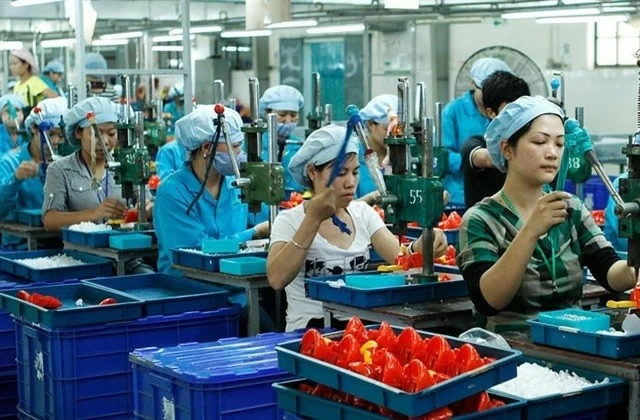
Finance Ministry proposes lower tax rate to support micro and small enterprises
Latest
 |
| Finance Ministry proposes lower tax rate to support micro and small enterprises: Workers at an electronic factory in the southern province of Dong Nai. (Photo: VNA) |
The tax cut, included in the draft Law on Corporate Income Tax (amended), is expected to be presented to the National Assembly for first review in October 2024 and for approval in May 2025.
Meanwhile, the Ministry has been gathering feedback on the draft law from governmental agencies and the public. It said one of the drafting committee’s key objectives was to create a more favourable tax regime for micro and small enterprises.
According to the draft law, a 15% tax rate is proposed for businesses with total revenue not greater than 3 billion VND, and a 17% tax rate is proposed for businesses with total revenue higher than 3 billion VND and lower than 50 billion VND.
The Ministry said that out of the 900,000 businesses currently operating, micro and small businesses account for nearly 94% and have been earmarked for preferential policies to help them develop production and long-term revenue. During the COVID-19 pandemic, they were also beneficiaries of many of the Vietnamese government’s support programmes.
International experience shows that many countries use tax support policies as a tool to promote the development of small businesses. For example, small businesses may be granted preferential tax rates, which could be a fixed tax rate or a progressive tax rate based on income streams.
The Ministry said in principle small businesses should enjoy a lower tax rate in comparison to large enterprises, but in practice, this policy will not apply to all small businesses.
According to the Law on Supporting Small and Medium Enterprises, a business is classified as small or medium if it employs an average of 200 workers and meets one of the following two criteria - total capital not exceeding 100 billion VND or total revenue in the preceding year not exceeding 300 billion VND.
Based on these criteria, micro and small businesses currently account for nearly 94% of all businesses in the country, and if medium-sized businesses are included, the group of micro, small and medium-sized enterprises accounts for over 97%. If these criteria were used to determine eligibility for preferential tax rates, almost all businesses in the country would qualify.
During the initial feedback process on the draft Law on Corporate Income Tax (amended), the business community expressed enthusiasm about the tax incentives, but was also concerned that some provisions in the draft law could pose policy risks.
They have called for greater clarity and stronger measures to help businesses manage risk, promote investment activities, streamline operations and create additional jobs.





















